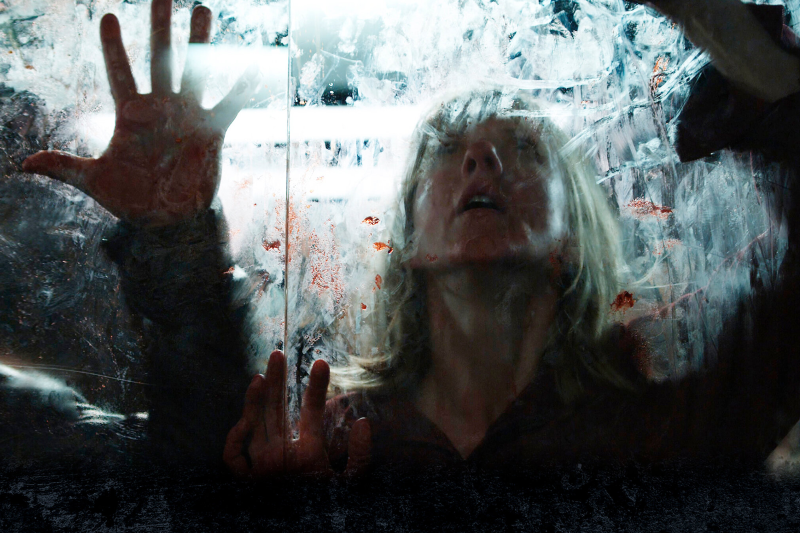While the gods of horror have seen fit to return to us the eight-figure feature, there’s still no high for fans of the genre quite like discovering a new low-budget talent. Hellcat, the debut of writer-director Brock Bodell, is a crafty exercise in how to withhold information from your audience while not talking down to them. It’s also an early standout at this year’s Fantasia International Film Festival and a shining example of the innovation in low-budget horror.
When Lena (a very strong Dakota Gorman) wakes up in a moving trailer, she has no clue how she got there or what might’ve happened to her. That is, until the voice of Clive (Todd Terry) comes through the intercom and tells her that she has been infected and needs immediate help. Clive claims that she was attacked while camping in the woods, and it was an act of true kindness that he loaded her in his truck and headed out to the hospital.
But the more Lena explores her new residence, the harder it is to believe Clive’s story. His fridge is full of raw meat and medical sedatives – meanwhile, the door to the trailer is held closed with an industrial-strength padlock. When Lena asks to talk to a family member, he holds the phone up to the speaker, but Clive refuses to return her phone to him or even gives him confirmation that he made the call. And it isn’t long before Lena discovers that a locked door at the back of the camper may contain the night’s biggest horror yet.
The rest, dear reader, is yours to discover. What makes Hellcat shine is the uncertainty of its story. On the surface, Clive seems like a sympathetic character – someone who is mourning his wife and looking for someone to save as his penance. But Clive also knows his truth to be unbelievable. He claims to be protecting Lena from a terrible disease, but his actions tell a different story – he withholds when he should tell the truth, and reacts with frustration when Lena tries to pin him down with specifics. But what is true is that Lena is suffering from some terrible disease. Did Clive cause it, or might he actually be what he claims?
This tension builds until the camera, finally, follows Clive into the cab of his truck. Here is where Hellcat introduces its version of Coast To Coast AM. The scenes where Clive turns to the so-called “experts” for help – a midnight talk show that focuses on cryptids and alien abductions – are some of the film’s sharpest, playing with for-profit conspiracy theories and the need for some to make sense of their world. And the more we understand the hold these shows have on Clive, the more we fear that he is not the good or honorable man he claims to be. This is Schrodinger's camper: Lena both is and is not in real danger in every moment of the movie, and watching Bodell thread that tension is low-budget filmmaking at its finest.
With any single-location horror film, there’s also the thrill of watching the filmmakers get away with it. Get away with a feature-length misdirection between low budgets and big ideas; get away with the feeling that there is a great big world just outside the four walls. Hellcat gets away with it in no small part thanks to its love of the surreal. Throughout the film, Lena loses herself to fantasies, imagining loved ones and enemies wandering through the narrow confines of the camper. Bodell also is not afraid to lean into the stagecraft of his film, playing with darkness and camera movements outside the vehicle that feel charmingly, intentionally artificial.
Consider one shot early in the film where the camera pulls back from the trailer, only showing us a shrinking slit of light as Lena peers frantically through an open window. As our portal into Lena’s world shrinks, the world outside the window remains inky and still. It’s not the kind of cinematography that is often found in modern horror, but watching a filmmaker play with the artifice of filmmaking – with prosthetics and production design – is a welcome reminder that horror does not need to be hypergrounded to be effective. Sometimes, we just want to see a production team see what they can wrestle from a makeshift sound stage.
By the end, Hellcat reveals itself to be a welcome entry in a specific canon of horror films. Bodell understands the role that conspiracy theories play in tearing families apart, but he saves some of his sharpest commentary for the big finale - including a piece of character development that bookends nicely (and a narrative swing that may elicit its fair share of groans and cheers). But whatever the end holds for Lena and Clive, what is obvious is that Bodell never loses sight of the humans at the heart of horror. Empathy may not be the word that immediately comes to mind for a film about a woman locked in a camper, but Hellcat has it in spades, and the genre is better off for it. [3.5/5.0]






